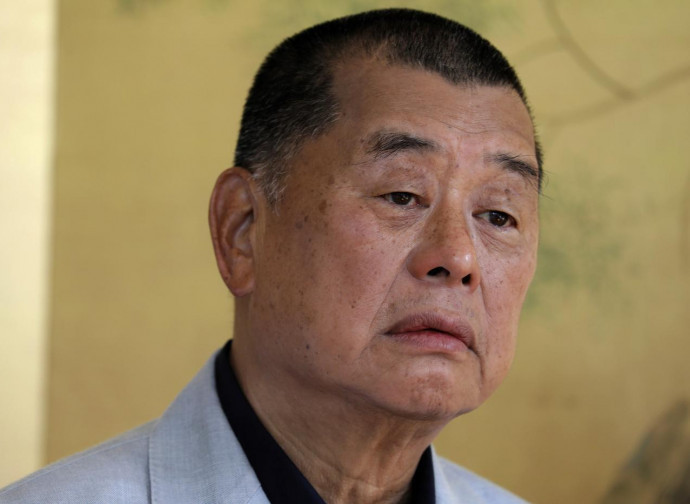Trump presses Xi during summit, “free Jimmy Lai”
At the summit in Busan, South Korea, US President Donald Trump discussed more than just trade with Xi Jinping. He also called for the release of Jimmy Lai, a Hong Kong Catholic businessman and publisher who has been held in prison since 2020.
- DOSSIER: A Roman Catholic against the Power

At the Busan bilateral meeting in South Korea, US President Donald Trump did not only talk about trade with Xi Jinping. He also used it to call for the release of Jimmy Lai, a Hong Kong-based Catholic businessman and publisher who has been imprisoned since 2020 under China's new National Security Law. The founder of the now-defunct Apple Daily newspaper has become a symbol of the community's resistance to Beijing's totalitarianism. The talks took place behind closed doors. Trump maintained the utmost discretion on the matter, as he always does when touching on the thorny subject of dissent in China.
Yesterday (31 October), Owen Jensen, Washington correspondent for the Catholic network EWTN, broke the news: 'A White House official confirmed to me that President Donald Trump discussed Jimmy Lai with President Xi during their meeting in South Korea. Furthermore, the official told me, 'As President Trump said, Jimmy Lai should be released, and he wants that to happen.' Last week, before leaving for Asia, President Trump reiterated to me that he would call for Lai's release."
This stance by the US president is consistent with his past and present commitment to securing Lai's release. During his election campaign, he promised this in an interview with Hugh Hewitt, saying: 'There is a man named Jimmy Lai who is very important to Catholics in America and around the world. He is a Catholic in Hong Kong, a big publisher and a billionaire. Xi keeps him in prison.' When Hewitt asked, 'Do you think you can talk to Xi when he returns to the presidency to get Jimmy Lai out of the country?', Trump replied, '100 per cent!' Trump replied firmly, '100 per cent!' Once re-elected, Trump reiterated his commitment to Jimmy Lai, saying: 'I will do everything I can to save him. His name is already on the list of priorities we're discussing, and we'll see what we can do.'
Commenting on the news, Jimmy Lai's son, Sebastien, said, "I am so incredibly grateful that the President discussed my father's case in his meeting with President Xi. Given President Trump's reputation as a "liberator-in-chief", I pray that his continued support and commitment will convince President Xi to release my father before it is too late.'
When Sebastien Lai accepted the Made for Truth award on Saturday 25 October, on his father’s behalf, he told the Daily Compass that, “freeing Jimmy Lai had become a humanitarian issue, and that he hoped international pressure would convince the Chinese authorities to release him, even if that meant expelling him from Hong Kong”. It is a humanitarian issue because a life sentence, like the one his father is facing, would be the equivalent of a death sentence. Seventy-eight years old in December and diabetic, Jimmy Lai is not being properly cared for and is subjected to a harsh prison regime in solitary confinement.'
Sebastien Lai is leading the campaign for his father's release, and he is well supported in his work. It is not only the American president who is calling for the release of Jimmy Lai, but also the United Nations (UN). Five UN special rapporteurs wrote in their report: "Jimmy Lai's arrest, detention, and the series of criminal proceedings he has faced in recent years appear to be directly linked to his criticism of the Chinese government and his support for democracy in the Hong Kong Special Administrative Region." The governments of the United Kingdom (Jimmy Lai has British citizenship), Canada, Australia and very recently Italy have all expressed support for his release.
However, as the head of the world's leading power, it is understandable that everyone looks to the US President as the key man in the liberation of Hong Kong's Catholic publisher. Before Trump's departure for his trip to Asia, a bipartisan group of 38 US senators signed a letter stating, 'We have deep respect for your outspoken defence of Mr Lai. You understand the urgency of his situation: he is a devout Catholic, a beloved husband, father and grandfather, and an ardent freedom activist. Now, after almost five years of solitary confinement, Mr Lai's trial under Hong Kong's National Security Act is coming to an end, but time is not on his side — he must be released immediately.'
International pressure carries risks. Following the letter from the US senators, the Chinese Foreign Ministry office in Hong Kong expressed 'strong dissatisfaction and determined opposition' to what it termed 'interference' by members of the US Congress in an internal Chinese matter. However, there are also opportunities. In an editorial in the Wall Street Journal, William McGurn cites an encouraging precedent from the time of the Bush administration: 'In the poisoned atmosphere after the Tiananmen Square massacre, US–China relations were compromised, and there was no way to restore them, because Fang Lizhi, a physicist and dissident, was a refugee in the US embassy in Beijing'. Former President Richard Nixon wrote a letter to Deng Xiaoping demanding Fang's release, as long as he remained in Beijing he would be an obstacle to China's diplomatic goals. Fang was released shortly after Deng received Nixon's letter.'
From this point of view, Trump could also secure Lai's release by presenting it as a means of resolving a delicate diplomatic situation in which China finds itself.
